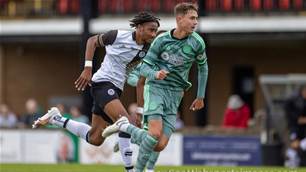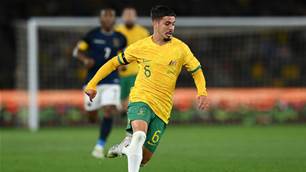He arrived talking about Barcelona and left bemoaning the Buddies.
Tony Mowbray drove south this afternoon after a wretched nine-month spell as Celtic boss came to an end following last night's 4-0 thrashing by St Mirren.
The first league defeat in Paisley for 21 years kept the Hoops 10 points behind Clydesdale Bank Premier League leaders Rangers, with the Ibrox side having two games in hand.
And for Mowbray, it was the final straw.
Chairman John Reid only last month stated the former Celtic defender deserved the "loyalty and moral support" of the board.
He said: "We feel we owe it to Tony to give him loyalty and backing during this time. The rebuilding task is huge but, as I've said, it is all about ensuring the longer-term success of Celtic on the field."
When the Celtic team bus arrived back at Parkhead to be confronted by angry fans, the board were more inclined to take notice of the 'Mowbray out' banner than remember the platitudes about patience.
Mowbray likes to cultivate his image as a football idealist but it proved his downfall at Celtic, as it did at West Brom.
We would all like our team to play like Barcelona, but perhaps it was not an ideal for the big Teessider to bring to the rough and tumble of the SPL and certainly not after leading a team to Barclays Premier League relegation.
Despite some early warnings in Europe, he banged on incessantly about his "football philosophy".
He continued to talk about his desire to play "expansive free-flowing football", while his team were dropping points to sides like Falkirk (twice) Aberdeen and Kilmarnock.
His struggle for consistency was perhaps not that surprising given the rapid changeover of a squad that had won three titles in four years under Gordon Strachan.
In came Marc-Antoine Fortune, Landry N'Guemo, Josh Thompson, Danny Fox - briefly - Zheng Zhi, Ki Sung-yueng, Robbie Keane, Diomansy Kamara, Edson Braafheid, Jos Hooiveld, Thomas Rogne, Morten Rasmussen and Paul Slane.
Out went Scott McDonald, Chris Killen, Gary Caldwell, Stephen McManus, Barry Robson, Mark Brown and Willo Flood - among others.
To add to the confusion, Irishman Darren O'Dea was sent on loan to Reading and then came back.
There is no doubt injuries prevented Mowbray finding any sort of consistency but he did not help himself by chopping and changing the team on a weekly basis and making some strange substitutions.
When Scott Brown and Aiden McGeady end up playing left-back, as they did at Rugby Park and St Mirren Park, respectively, then you know something is not quite right.
As the gap behind Rangers at the top of the table grew to a chasm, Mowbray claimed that he wasn't concerned about clean sheets. His side shipped 33 SPL goals in comparison to Rangers' 16. Perhaps he should have been.
In his final weeks, Mowbray stepped up his criticism of the media, reminding everyone of the old Tommy Docherty joke: "The press got me the sack - they kept printing the results."
With nowhere left to go after the St Mirren debacle, he turned on Rangers and the SPL in general.
"They set up differently - maybe that's the way to go," he said.
"Maybe it isn't a league for trying to force the game and be expansive - maybe it is a league for playing defensive, negative football and having quality up front to counter-attack."
Rangers have scored eight more league goals than Celtic and played two fewer games.
Mowbray and statistics, though, appear to enjoy an uneasy relationship.
League Managers Association chief executive, Richard Bevan, expressed his surprise that Mowbray had parted company with Celtic after less than a year and pointed to the Teesiders' win-ratio of 45% in 297 matches.
It is a statistic that might look good in England but it represents abject failure for an Old Firm boss.
Perhaps Mowbray should have surrendered his football principles to pragmatism when he returned to Scotland last summer.
He will surely have to in the future if he wants to stay in the game at a high level.
Unless, of course, he receives a call from the Nou Camp.
The first league defeat in Paisley for 21 years kept the Hoops 10 points behind Clydesdale Bank Premier League leaders Rangers, with the Ibrox side having two games in hand.
And for Mowbray, it was the final straw.
Chairman John Reid only last month stated the former Celtic defender deserved the "loyalty and moral support" of the board.
He said: "We feel we owe it to Tony to give him loyalty and backing during this time. The rebuilding task is huge but, as I've said, it is all about ensuring the longer-term success of Celtic on the field."
When the Celtic team bus arrived back at Parkhead to be confronted by angry fans, the board were more inclined to take notice of the 'Mowbray out' banner than remember the platitudes about patience.
Mowbray likes to cultivate his image as a football idealist but it proved his downfall at Celtic, as it did at West Brom.
We would all like our team to play like Barcelona, but perhaps it was not an ideal for the big Teessider to bring to the rough and tumble of the SPL and certainly not after leading a team to Barclays Premier League relegation.
Despite some early warnings in Europe, he banged on incessantly about his "football philosophy".
He continued to talk about his desire to play "expansive free-flowing football", while his team were dropping points to sides like Falkirk (twice) Aberdeen and Kilmarnock.
His struggle for consistency was perhaps not that surprising given the rapid changeover of a squad that had won three titles in four years under Gordon Strachan.
In came Marc-Antoine Fortune, Landry N'Guemo, Josh Thompson, Danny Fox - briefly - Zheng Zhi, Ki Sung-yueng, Robbie Keane, Diomansy Kamara, Edson Braafheid, Jos Hooiveld, Thomas Rogne, Morten Rasmussen and Paul Slane.
Out went Scott McDonald, Chris Killen, Gary Caldwell, Stephen McManus, Barry Robson, Mark Brown and Willo Flood - among others.
To add to the confusion, Irishman Darren O'Dea was sent on loan to Reading and then came back.
There is no doubt injuries prevented Mowbray finding any sort of consistency but he did not help himself by chopping and changing the team on a weekly basis and making some strange substitutions.
When Scott Brown and Aiden McGeady end up playing left-back, as they did at Rugby Park and St Mirren Park, respectively, then you know something is not quite right.
As the gap behind Rangers at the top of the table grew to a chasm, Mowbray claimed that he wasn't concerned about clean sheets. His side shipped 33 SPL goals in comparison to Rangers' 16. Perhaps he should have been.
In his final weeks, Mowbray stepped up his criticism of the media, reminding everyone of the old Tommy Docherty joke: "The press got me the sack - they kept printing the results."
With nowhere left to go after the St Mirren debacle, he turned on Rangers and the SPL in general.
"They set up differently - maybe that's the way to go," he said.
"Maybe it isn't a league for trying to force the game and be expansive - maybe it is a league for playing defensive, negative football and having quality up front to counter-attack."
Rangers have scored eight more league goals than Celtic and played two fewer games.
Mowbray and statistics, though, appear to enjoy an uneasy relationship.
League Managers Association chief executive, Richard Bevan, expressed his surprise that Mowbray had parted company with Celtic after less than a year and pointed to the Teesiders' win-ratio of 45% in 297 matches.
It is a statistic that might look good in England but it represents abject failure for an Old Firm boss.
Perhaps Mowbray should have surrendered his football principles to pragmatism when he returned to Scotland last summer.
He will surely have to in the future if he wants to stay in the game at a high level.
Unless, of course, he receives a call from the Nou Camp.
Copyright (c) Press Association
Related Articles

Meet the last Aussie standing at Celtic
It's a Kewell-Hutchinson double act at post-Muscat Marinos













